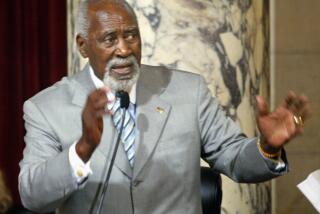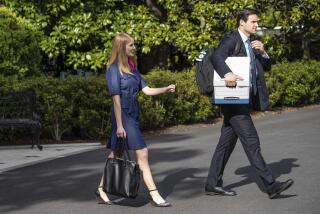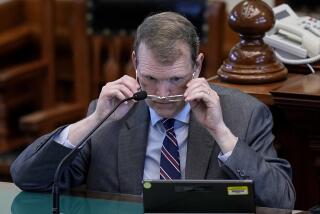Trade Trips Were Used to Raise Funds, Brown Friend Says
- Share via
WASHINGTON — An indicted former confidant of Ronald H. Brown swears that the late Commerce secretary told her the White House had directed that the agency’s trade missions be used to solicit 1996 campaign contributions from those taking the trips.
According to documents released Monday, Nolanda S. Hill, the confidant and onetime Brown business associate, also quoted Brown as complaining that White House officials “instructed him” to delay production of subpoenaed records that might reflect this scheme.
The allegations--denied by the White House--represent the strongest support to date for long-held suspicions that overseas missions under Brown’s leadership frequently were used for partisan political purposes.
Hill’s affidavit was made public by U.S. District Judge Royce C. Lamberth in a civil freedom-of-information lawsuit brought by Judicial Watch, a conservative legal foundation.
In the 3-year-old lawsuit and in numerous interviews with reporters, Commerce Department officials have insisted that U.S. business executives were chosen to accompany Brown on overseas trips based on a set of objective criteria and that political contributions played no part in their selection. The criteria, they said, included the overseas interests of U.S. companies and how well they could carry out projects in a foreign country.
Hill, who was indicted earlier this month on business-fraud charges unrelated to the pending civil case, said that Brown, a onetime business partner, “told me that domestic companies were being solicited to donate large sums of money in exchange for their selection to participate on trade missions. . . . “
“Ron expressed to me his displeasure that the purpose of the Commerce trade missions had been and were being perverted at the direction of the White House,” she added in her affidavit, dated Jan. 17.
Hill said that she “further learned through discussions with Ron that the White House, through Leon [E.] Panetta [former chief of staff] and John Podesta [a senior presidential aide], had instructed him to delay the case by withholding the production of documents prior to the 1996 elections and to devise a way not to comply with the court’s orders.”
White House spokesman Jim Kennedy said: “Ms. Hill’s allegations regarding Leon Panetta and John Podesta and the White House are false in every respect.”
Podesta added that the only accurate feature of Hill’s affidavit “is the spelling of my name.”
Panetta, a former congressman from Carmel Valley who quit his White House job late last year, could not be reached at his office in California.
Brown and 34 others on a trade mission died in April 1996 when their government plane crashed into a mountainside in Croatia. His former attorney, Reid Weingarten, did not respond to a message left at his office about Hill’s allegations.
Hill, in her affidavit and again in live testimony Monday in Lamberth’s courtroom, said that about four weeks before his death Brown showed her a packet of documents about an inch thick that the department had collected in response to subpoenas from Judicial Watch.
She said that “five or six” letters she examined, which had been sent to trade-mission participants, “specifically referenced a substantial financial contribution” to the Democratic Party.
Brown used profanity in describing how an aide, Melissa Moss, had written the letters, apparently without his approval, Hill testified. Before assuming his Cabinet post, Brown was chairman of the Democratic National Committee.
In a separate deposition provided to Larry Klayman, who heads Judicial Watch, Moss insisted that objective criteria always were used to select companies to go on the overseas missions. However, studies last year by The Times and other news organizations showed that companies which had given political contributions to the Democrats generally were more likely to be chosen for the trips.
Hill, 53, a Dallas entrepreneur, was charged by a federal grand jury with diverting more than $200,000 from companies she controlled.
More to Read
Sign up for Essential California
The most important California stories and recommendations in your inbox every morning.
You may occasionally receive promotional content from the Los Angeles Times.













